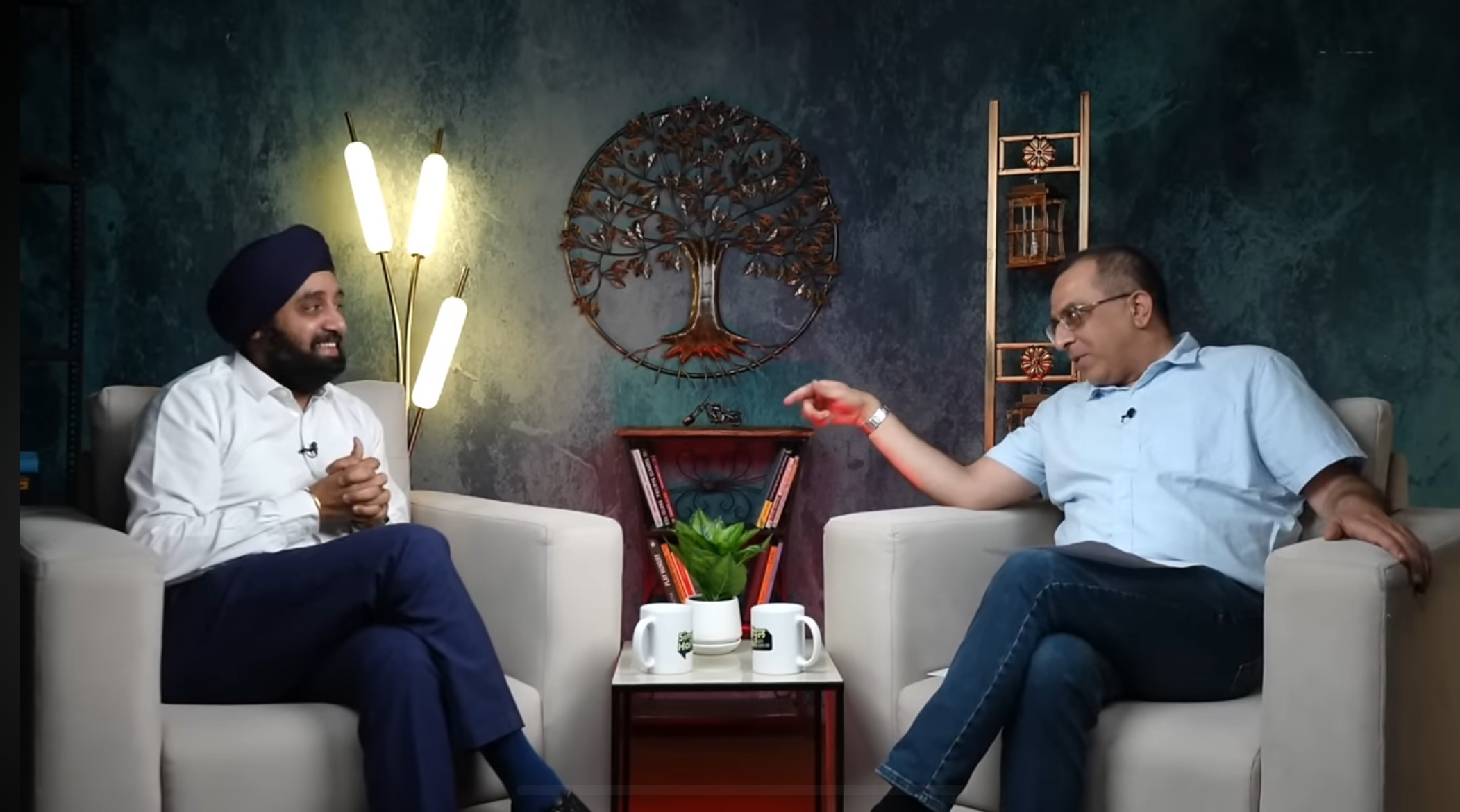
In a deeply insightful episode of the Simple Hai! podcast, hosted by veteran finance journalist Vivek Law, celebrated portfolio manager and market mentor Gurmeet Chadha opened up about his life, investment philosophy, and the habits that shape successful investors. From consistent running as meditation and path for wellbeing to investing with humility, Gurmeet’s grounded and spiritually inclined approach stood out for its clarity and authenticity.
Health is the Real Wealth
Gurmeet Chadha, a widely followed portfolio manager, emphasized early in the episode that “health is the biggest wealth.” Managing wealth for others, he said, brings immense pressure, and staying fit is not a choice but a necessity. For him, running serves as both a fitness routine and a form of mental therapy, helping him disconnect, reflect, and stay spiritually grounded.
The Humble Journey from Sagar to Market Expert
Growing up in Sagar, Madhya Pradesh, with limited resources and no exposure to elite education, Gurmeet was once plagued by stage fright. His first media interaction, he recalled fondly, was with Vivek Law. From there, his journey has been one of resilience and humility. “In our community, doing an MBA was rare,” he shared. “They used to call me the first MBA in my family.”
5 Traits of Successful Investors
Drawing on years of experience and interactions with industry stalwarts like Warren Buffett and Rakesh Jhunjhunwala, Gurmeet outlined five key habits of great investors:
- Stay Humble: True investors never boast about their returns.
- Keep Learning: Markets are the ultimate teachers, and the learning never stops.
- Be Adaptable: Many once-dismissed sectors like PSUs and defense have recently outperformed.
- Think Contrarian: Good investors don’t waste a crisis—they see opportunity in adversity.
- Stay Consistent: Great wealth is built through slow and steady compounding, not quick wins.
The Two Kinds of Investors Today
Gurmeet categorized modern investors into two broad types:
- Fast-track Investors, driven by impatience and the thrill of derivatives, often incur losses.
- Disciplined Wealth Builders, who invest systematically, think long-term, and understand that “the fastest way is slowly.”
He cited SEBI data showing that over 95% of retail derivative traders incur losses, and yet the segment keeps growing due to the lure of high, fast returns.
The Power of SIP and India’s Investment Growth
Reflecting on India’s mutual fund growth, Gurmeet predicted that monthly SIP inflows, which recently crossed ₹21,000 crore, could touch ₹50,000 crore in the next 3-4 years. With only 4 crore investors currently and 56 crore PAN-Aadhaar linked individuals, the market is poised for exponential growth. He called this trend a “tsunami of retail investing.”
Simple Investment Strategies for Beginners
For new investors, Gurmeet recommends starting with:
- Balanced Funds, for low volatility
- Index Funds, for passive exposure to India’s top 50 or 100 companies
- Stock SIPs, for more advanced and disciplined investors
He shared that the Sensex has delivered 14% CAGR over the last 44 years, closely tracking India’s nominal GDP growth. “If India continues growing at 12-13%, then there’s nothing better than an index fund,” he noted.
Common-Sense and Observation
Gurmeet illustrated how observational insights can lead to profitable investments. He and his partner once invested in Tata Global Beverages (now Tata Consumer Products) based on Starbucks’ popularity, only to discover its real value lay in staples like tea, pulses, and ready-to-eat foods. That stock has since increased nearly 10 times, driven by India’s shift toward branded, organized consumption. Putting the observations and research to use remains an important aspect.
India’s Best Decade Lies Ahead
Confident in the country’s trajectory, Gurmeet believes India is entering its most promising decade, moving from a $3 trillion to an $8-10 trillion economy. “China saw massive wealth creation during this stage. We’re at the cusp of something similar,” he said.
Despite past turbulence—from wars to scams—India’s markets have delivered, and Gurmeet is optimistic they will continue to do so.
Underrated Sector: Waste Management
When asked about future opportunities, Gurmeet pointed to waste management as a severely overlooked but high-potential sector. With mounting garbage in metros and low sewage treatment rates, companies in plastic recycling and water treatment are likely to see exponential growth. He highlighted Ganesha Ecosphere as a promising player in this space.
Rooted in Simplicity and Purpose
Despite his success, Gurmeet remains deeply connected to his roots. “In small towns, people don’t judge you by your car or clothes,” he said. He hopes to one day give back to his hometown and dreams of listing his company on the NSE, a goal he is pursuing with his co-founder.
He closed the episode with a heartfelt line from Gurdas Maan that reflects his family’s resilience:
“Mat yakin kar apne haath ki lakeeron par, kismat uski bhi hoti hai jiske haath nahi hote.”
(Don’t rely on your palm lines; destiny also belongs to those who don’t have hands.)
Leave a Reply